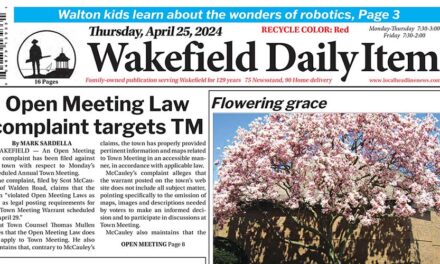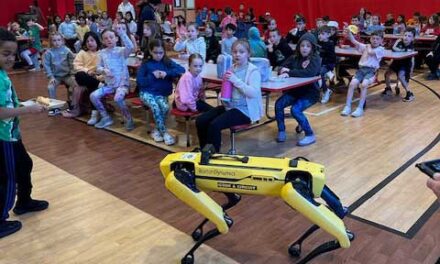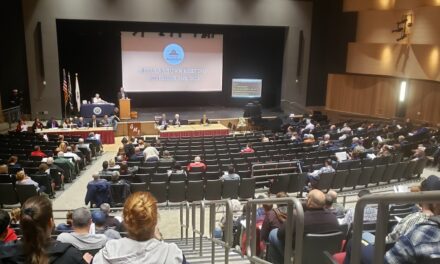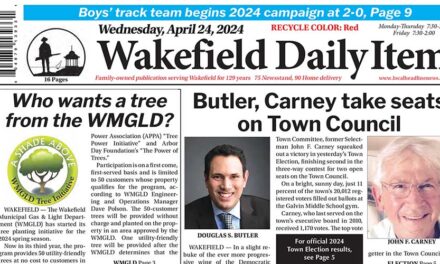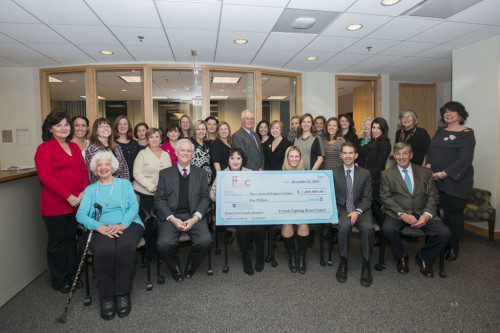
AN AMAZING milestone was achieved by Friends Fighting Breast Cancer (FFBC) when the all-volunteer non-profit reached its goal of donating $1 million in total giving to breast cancer research at Mass. General Boston. Celebrating the milestone with doctors from the Cancer Center were many past and present members. Front row, from left: Mary Gritti, Dr. Jerry Younger, co-founder Fran Gilardi, chairperson Katie O’Neill Britton, Dr. Leif Ellisen, Dr. Bruce Chabner; middle row, from left: Joanne Tenaglia, Danielle Tenaglia, Maureen Doherty, Julie Connolly O’Neill, Anne Fields, Barbara Rodrigues, Joanne Connolly Leach, Kara Kieran, Michael O’Neill, Debbie Burke, Stephanie Aguiar, Elizabeth Stone, Kate Sullivan Marr, Davi-Ellen Chabner, Theresa Gritti; back row, from left: Helen O’Carroll, Brenda Sutherland, Lori Pelletier, Karen Karim, Katelyn Kerrigan, Jenna Stone, Kristin Quinn and Mary Donald. (MGH Photo)
By MAUREEN DOHERTY
NORTH READING — Friends Fighting Breast Cancer (FFBC) was launched around the kitchen tables of Janet Connolly O’Neill’s friends and neighbors in North Reading back in 1996 to support the grassroots research she believed would give the next generation of women a fighting chance against the ravages of this disease.
The knowledge that something good would come from her own struggles with breast cancer gave her hope and inspired everyone she met throughout her 13-year battle with the disease. Staying true to their mission, the non-profit has remained an all-volunteer labor of love with all proceeds donated to innovative breast cancer research at Massachusetts General Hospital’s Cancer Center.
Nearly two decades after that first fancy dinner dance attended by hundreds raised several thousands of dollars for their fledgling cause, FFBC has eclipsed an amazing milestone – $1 million in total giving to landmark research undertaken at MGH.
Joanne Connolly Leach, a longtime Wakefield resident, was a founding member of FFBC along with her sister, Julie, and their late mother, Lee. They all wanted to support Janet in her desire to be pro-active in her fight and in laying the groundwork that Janet hoped would lead to a cure in her daughter Katie’s lifetime. Katie O’Neill Britton was just 8 when her mother was diagnosed in 1989. Following in her mother’s footsteps, today she is a wife and mother juggling a career while serving as the chairperson of FFBC.
Asked what it meant to her to see FFBC achieve this milestone, Leach said it was surreal. “I think of the power of women, ordinary women, who came together and did extraordinary things. It was all driven for a love of a person. At the beginning, that sustained it,” she said.
The committee pressed on over the years as more of their own members either had breast cancer themselves or were affected by the diagnosis of close family members, friends and colleagues.
“I’m just in awe and thrilled that we’ve gone this far,” Leach said, adding, “At the beginning we didn’t know it was going to be long-term. We thought it would be a couple of dances here and there but you can’t let it go because breast cancer doesn’t go away.” Subsequent to Janet’s death in 2002, two other members of FFBC have died of the disease, Karen Butland and Corinne Gallant.
Leach said her sister would be “amazed and honored” by the achievement but not surprised. True to her fun-loving nature, she would be singing from the rooftops celebrating it.
Leach often recalls hearing Janet say that having breast cancer changed her life in a lot of positive ways. “Maybe running for school committee would have always been a wish and she wouldn’t have done it but when you know your life is going to be cut short you just do it all,” Leach said.
“She lived life to the fullest and she was so incredibly pro-active. That’s how Janet earned so much respect from so many people. She was already a leader to begin with as a teacher and as an administrator and then to see how she led her life battling breast cancer. It wasn’t an easy road. Having cancer was never an excuse not to do something. It was just always another reason to do more in life. That was Janet in a nutshell,” her sister said.
Recognition from MGH
The grateful doctors and researchers recently celebrated the $1 million achievement with past and present members of FFBC, sharing the breakthroughs achieved by scientists and oncologists made possible through the sustained giving efforts of FFBC.
Leif Ellisen, MD, Ph.D., the director of the Breast Medical Oncology Program at MGH, said current trends in biomedical research are making a bigger and more immediate impact on patients in real time.
However, financial support for this type of research from traditional sources, like the federal government, has declined, Ellisen said, making them more dependent on partnerships with “talented philanthropists like yourselves to accomplish this kind of work for patients. In particular, what you have done over so many years with sustained funding is the type of effort that allows us to achieve really major milestones year-to-year, using the support and being able to carry projects through.”
The rise of Ellisen’s career at MGH has mirrored that of FFBC, beginning in 1996 as a newly trained oncologist specializing in breast cancer research. In the 1990s, that work focused on identifying breast cancer genes in the highest risk women. By the 2000s, those discoveries led to the development of genetic testing to screen patients for markers of potential disease. By the 2010s, backed by years of data on high risk patients, researchers began developing more accurate intervention methods for such women, in part by studying their breast tissue before cancer develops.
1990s: Identify breast cancer genes
Working in the laboratory of Dr. Daniel Haber, who is now the Cancer Center director at MGH, Ellisen recalled they were “trying to find the genes that caused women to be at the highest risk of breast cancer because we knew there were some women who were at this very high risk but we didn’t exactly know how to identify them. Through the work that you supported there were landmark papers published by our laboratory in the ‘90s reporting the discovery of these genes.”
This discovery provided the blueprint oncologists and researchers needed to find those women and “start the process of learning what do we do about it, because if you can’t identify who these women are at the highest risk, you don’t know how to help them,” Ellisen said.
2000s: Genetic tests developed
In the early 2000s, as Ellison graduated from fellow to staff oncologist to director of the Cancer Genetics Program in breast cancer, they had developed the ability to “test women for these genes that we had identified, in part through your support in the ‘90s, identify who they were and then develop screening and prevention algorithms, which saved lives,” Ellisen said.
During this decade researchers were gaining access to “very substantial” published data collected from thousands of women across the world, which Ellisen said shows what can be done “to help intervene to save the lives of those women who are so highly at risk for breast cancer. That was a major milestone.”
2010s: Benefiting patients in real time
Beginning in the 2010s, as FFBC renewed its commitment to attain the $1 million milestone in total sustained giving to breast cancer research at MGH, Ellisen was appointed director for breast medical oncology at MGH and he continues to see patients in the clinic. In this role, his major vision has been “to bring what we’re doing in the laboratory to the patients.”
While genetic testing can identify women at the highest risk of developing breast cancer, it is not known when or if they will ever develop the disease. Therefore, Ellisen said, their current focus is on understanding “the biology of those high risk women in order to have better indicators of when they might be developing cancers … and how we might intervene before that happens to stop the cancers.”
Many of these women choose to have surgical removal of their breasts before the disease strikes. Although Ellison said their surgeons do a wonderful job with breast reconstruction it remains “quite a significant impact on a woman’s life to have that kind of surgery.”
Taking advantage of the fact that MGH is one of the largest centers in the world for preventive mastectomies, his lab recently developed a research protocol utilizing a team of people in the clinic, operating room and laboratory to collect this healthy breast tissue, which was previously discarded. Their goal is to analyze it for the earliest abnormalities to “figure out the biology of that predisposition and identify the markers and the ways that we can prevent it,” Ellisen said.
Ellisen said he is extremely grateful for the support of groups like FFBC that have been there at every step in the process “which has allowed us to move forward in a very rapid and effective way.”
Power of women, past and present
“You’ve all played such a significant part in getting us to this point,” FFBC Chairperson Katie O’Neill Britton told the past and present members. “When Friends Fighting Breast Cancer started I was 16 years old and now 17 years later here we are and we’ve reached $1 million,” she said, recalling how astounded they were to raise $25,000 or $35,000 at a single event in the early years.
“We’ve done so much as a group of women that just really volunteer their time to do something good for other people,” Britton said. “I was blown away when I started as a kid watching the energy that everybody had to do this work and then when I reached out a few years ago to another generation to see if you wanted to keep it going. Could we raise $290,000? And every single person came back saying, ‘Let’s do this,’” she said.
“This milestone is special but having all of you here to celebrate in that is even more special to me,” Britton said. Among those present was Dr. Jerry Younger, whom Britton thanked personally. “He was my mother’s oncologist and for 13 years, gave us a lot of hope. That kept us going and gave us my mom for probably a lot longer than we would have had she not been with Dr. Younger and not been at Mass. General.”
In addition to congratulating FFBC on achieving its financial goal, Younger offered his praise for “what you’ve done for your community, raising awareness, supporting patients who have breast cancer and I think, in many instances, other forms of cancer.”
It had been Dr. Younger who inspired Janet Connolly O’Neill to spark a movement that would support grassroots research to unravel the mystery of cancer. “I remember the first time I went to a Friends Fighting Breast Cancer affair,” he recalled, “Janet had not told me this … I thought it was going to be maybe 100 people and when I got there I think there were 950. What a community support and what a wonderful way to raise awareness!”
Janet’s husband, Michael O’Neill, said he was “extremely proud of my daughter, Katie, for the work and the effort when she took this over … and to make this such a success.” He also praised Franny Gilardi “who initially, with Janet, started this organization. I want to recognize everybody for all of the hard work that you’ve done over these years. It is a tremendous achievement for everybody that has been associated with this organization.”
“And I also want to thank Debbie Burke, who on her own initiative established a fund raising event which successfully added to that kitty of money that is represented here tonight in that $1 million,” O’Neill said.
Burke, the associate chief nurse at MGH, is a breast cancer survivor herself and FFBC member. In 2005, she launched a Wine Tasting Dinner and Silent Auction at Lucca North End with the help of family, friends and colleagues. Now held at Lucca Back Bay, to date she has raised $210,844 on behalf of FFBC.
“As a breast cancer survivor and fundraiser and MGH employee, I’ve been able to see first hand the progress made in breast cancer research. Since my diagnosis 16 years ago, I have seen significant progress. Under the leadership of Dr. Leif Ellisen, breast cancer research has a true champion who has been leading the development of new and better approaches to breast cancer screening, prevention and treatment,” Burke said.
“It is important for me to be a part of this fight. Since my diagnosis, my sister and mother have also been diagnosed with breast cancer, so I am passionate about continuing my fundraising efforts,” Burke added.
Dr. Bruce Chabner, director of Clinical Research at the Mass. General Cancer Center, recalled that FFBC events were “one of the first things that we enjoyed” when he and his wife, Davi-Ellen, arrived at Mass. General about two decades ago. “We just followed the growth of this organization. The persistence of the organization through the years has been wonderful. It’s groups like this that make our jobs so much easier and so much more satisfying. And of course this is an important cause for us in many ways, personally,” Chabner said. In addition to attending the dances they also ran in FFBC’s Homecoming Hustle 5K races.
Davi-Ellen Chabner laughed as she recalled, “This is the organization that launched my marathon career! It gave me the courage and the confidence – especially Janet O’Neill – her inspiration was so important to me as a breast cancer survivor myself. I want to thank everybody in this room for, as Katie said, keeping it up. It’s a real testament to the power of women.”

